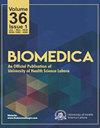Pretreatment with Ajwa dates (Phoenix dactylifera Linn) prevents development of alloxan-induced diabetes in rats
IF 0.6
4区 医学
Q4 TROPICAL MEDICINE
引用次数: 0
Abstract
ABSTRACT Background and Objective: A global increase in the prevalence of diabetes mellitus (DM) is associated with increased morbidity and mortality. Oxidative stress is a fundamental component in the pathogenesis of DM Ajwa dates are known to have a high antioxidant content, especially in their seeds. Hence this study was designed to determine the preventive effects of Ajwa date fruit on alloxan-induced diabetes in an experimental rat model. Methods: This experimental study was conducted at the Post Graduate Medical Institute, Lahore, Pakistan. A total of forty Sprague-Dawley rats were divided into five groups with eight animals in each. Rats in group A were normal control, whereas rats in group B were induced with intraperitoneal alloxan (160 mg/kg body weight) to develop diabetes. Groups C, D, and E rats were fed on a diet supplemented with Ajwa flesh, seed, and whole Ajwa respectively for 1 week. Blood and urine glucose levels were measured on days 0, 7 (pre-alloxan) and 11, 14, 19 (post-alloxan). Serum insulin, homeostatic model assessment (HOMA) for β-cell function (HOMA-β), and insulin resistance (HOMA[1]IR) were estimated terminally. Results: Diabetes was induced successfully in animals of all experimental groups except the normal control group. Rats of the Ajwa-seed group (D) showed relative resistance to diabetes induction with three non-diabetic rats on day 19. In group E, rats had lower blood sugar levels than rats in group C (p = 0.010). Serum insulin, HOMA-β and HOMA-IR, revealed partial beta cells restoration in the experimental animals of groups D and C. Insulin resistance was significantly higher, despite the highest insulin level (3.77 µIU/ml; p value <0.001) in group C. Conclusion: Ajwa date seed powder appears to provide relative protection against the development of diabetes in rats induced by alloxan.用Ajwa枣(Phoenix dactylifera Linn)预处理可以防止大鼠四氧嘧啶诱导的糖尿病的发展
背景与目的:全球糖尿病(DM)患病率的增加与发病率和死亡率的增加有关。氧化应激是糖尿病发病机制的一个基本组成部分,已知Ajwa枣具有高抗氧化剂含量,特别是在其种子中。因此,本研究旨在确定Ajwa枣对四氧嘧啶诱导的糖尿病大鼠模型的预防作用。方法:本实验研究在巴基斯坦拉合尔研究生医学研究所进行。40只Sprague-Dawley大鼠被分成5组,每组8只。A组为正常对照,B组为腹腔注射四氧嘧啶(160 mg/kg体重)诱导糖尿病。C、D、E组大鼠分别饲喂在饲粮中添加Ajwa肉、种子和全Ajwa的饲粮,饲喂1周。在第0、7天(四氧嘧啶治疗前)和第11、14、19天(四氧嘧啶治疗后)测量血和尿糖水平。最后评估血清胰岛素、稳态模型评估(HOMA) β-细胞功能(HOMA-β)和胰岛素抵抗(HOMA[1]IR)。结果:除正常对照组外,其余试验组均成功诱导糖尿病。第19天,水草籽组(D)与3只非糖尿病大鼠表现出相对的糖尿病诱导抗性。E组大鼠血糖水平低于C组(p = 0.010)。血清胰岛素、HOMA-β和HOMA- ir显示D组和c组实验动物部分β细胞恢复,尽管胰岛素水平最高(3.77 μ IU/ml;结论:Ajwa枣籽粉对四氧嘧啶诱导的大鼠糖尿病的发生具有一定的保护作用。
本文章由计算机程序翻译,如有差异,请以英文原文为准。
求助全文
约1分钟内获得全文
求助全文
来源期刊

Biomedica
医学-热带医学
CiteScore
1.60
自引率
0.00%
发文量
76
审稿时长
>12 weeks
期刊介绍:
Biomédica is the quarterly journal of the Instituto Nacional de Salud of Colombia [Colombias National Health Institute]. Its purpose is to publish the results of original research that contributes meaningfully to knowledge in health and biomedical sciences.
 求助内容:
求助内容: 应助结果提醒方式:
应助结果提醒方式:


